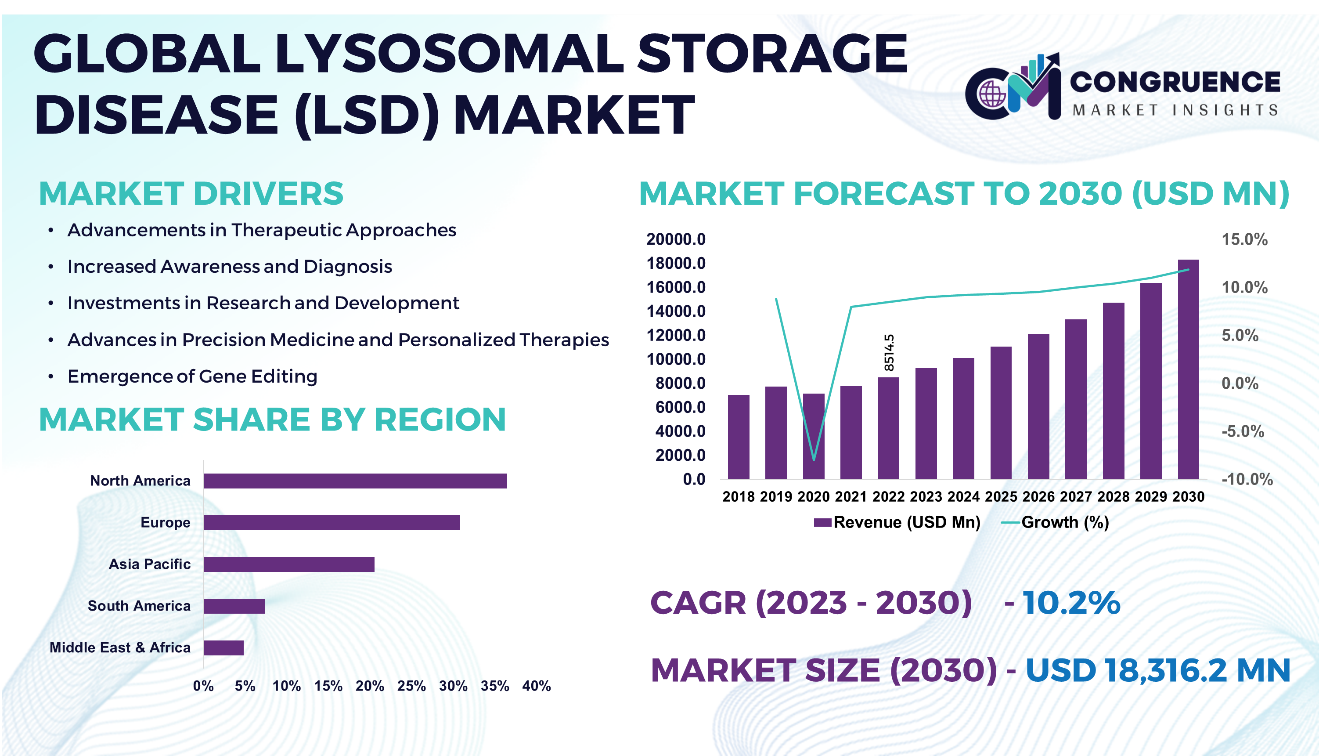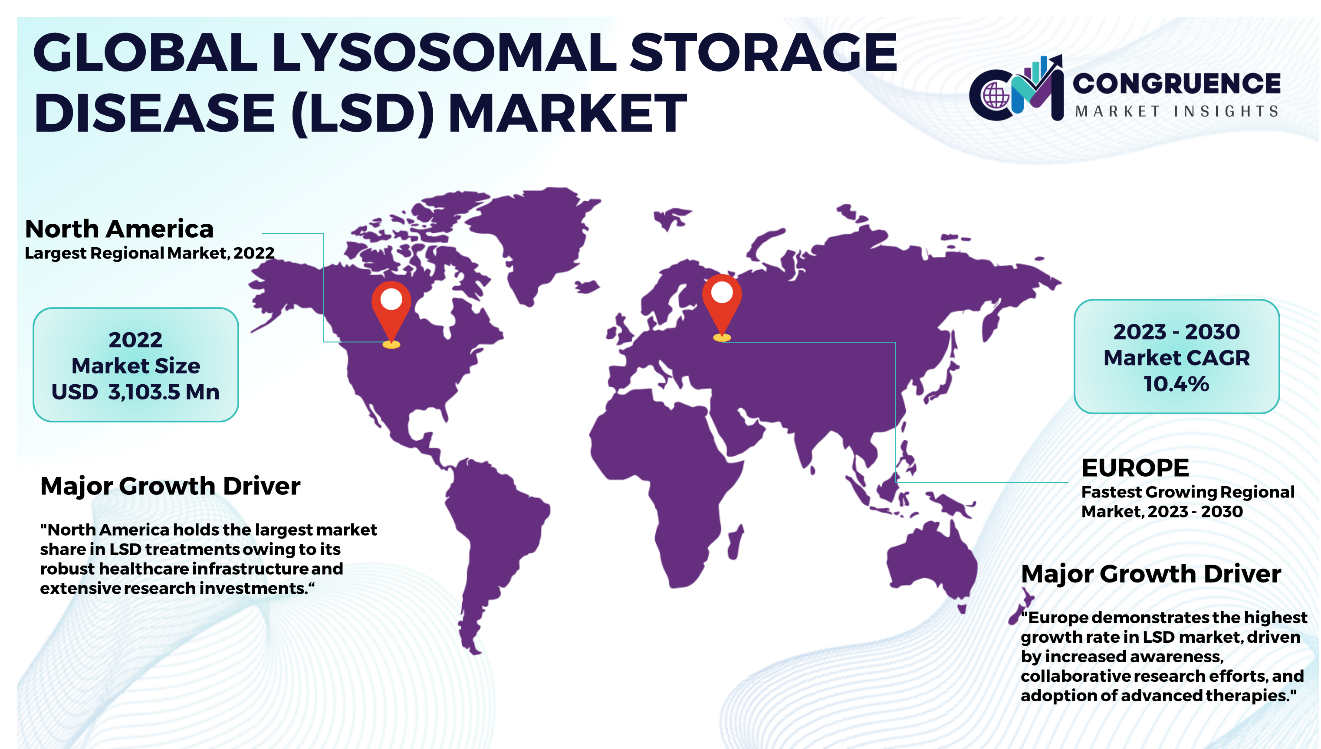Reports
The Global Lysosomal Storage Disease (LSD) Market was valued at USD 8,514.5 Million in 2022 and is anticipated to reach a value of USD 18,316.2 Million by 2030 expanding at a CAGR of 10.2% between 2023 and 2030.
The Lysosomal Storage Disease (LSD) market is rapidly changing due to increased investment in research and development, improvements in therapeutic techniques, and an increase in the incidence of these uncommon genetic illnesses. Enzyme replacement therapy (ERT), substrate reduction therapy (SRT), and hematopoietic stem cell transplantation (HSCT) have been the mainstays of treatment in the past for managing symptoms and delaying the course of the disease. But newer technologies like precision medicine and gene therapy are changing the way that treatments are provided. With its ability to provide more precise and quick diagnosis, individualized treatment plans, and advanced disease progression modelling, artificial intelligence has the potential to completely transform the way LSD is treated. AI in healthcare holds the potential to improve therapeutic results and raise the standard of living for those who use LSDs.

To learn more about this report, request a free sample
copy
Lysosomal Storage Disease (LSD) Market Major Driving Forces
Advancements in Therapeutic Approaches: Ongoing investigations and development work have produced novel therapeutic approaches, including as gene therapy, enzyme replacement therapy (ERT), substrate reduction therapy (SRT), and small molecule therapies. These developments open up new possibilities for controlling LSDs and improving patient outcomes.
Increased Awareness and Diagnosis: Better diagnostic tools and heightened knowledge among medical professionals have made it possible to diagnose LSDs sooner and with greater accuracy, which has increased demand for treatments and opened up new commercial opportunities.
Investments in Research and Development: The hunt for new LSD therapies is being fueled by a rise in funding from academic institutions, biotechnology businesses, and pharmaceutical companies. This investment promotes innovation and helps the market grow.
Advances in Precision Medicine and Personalized Therapies: The use of personalized medicine and precision medicine allows for customized interventions based on each patient's unique genetic profile and illness features, improving the efficacy of treatment.
Emergence of Gene Editing: Advances in genome editing technologies, such CRISPR-Cas9, have the potential to rectify genetic abnormalities that are responsible for learning disorders. Research activities aimed at potentially curative treatments are driven by these technologies.
Lysosomal Storage Disease (LSD) Market Key Opportunities
Precision Medicine and Personalized Therapies: Precision medicine has made it possible to customize treatment plans based on the unique characteristics of each patient, which presents a chance to maximize therapeutic benefits and reduce side effects.
Expansion of Therapeutic Options: The market sees potential for growth in the development and commercialization of innovative therapeutics, such as gene therapies, small molecule medications, and advanced biologics, to address unmet medical requirements in the treatment of LSD.
Lysosomal Storage Disease (LSD) Market Key Trends
· Expansion of Therapeutic Options, Personalized Therapies, and Precision Medicine
· Growing funding and interest in using gene editing technology to create LSD-curing therapies.
· Ongoing research and development of ERTs of the next generation with enhanced dosage and efficacy.
· A greater focus on unmet medical needs in uncommon diseases such as LSDs by pharmaceutical corporations.
· Using precision medicine techniques to customize patient care according to their clinical and genetic profiles.
· A growing focus in LSD therapy approaches on patient requirements, quality of life, and holistic disease management.
Region-wise Market Insights
North America accounted for the largest market share at 36.45% in 2022 whereas, Europe is expected to register the fastest growth, expanding at a CAGR of 10.4% between 2023 and 2030.

To learn more about this report, request a free sample
copy
North America is in the lead because of its robust R&D spending, kind regulatory framework, and powerful healthcare system. The area is positioned as a pioneer in LSD treatment breakthroughs because to its cutting edge medical facilities and innovation-focused mindset. Furthermore, Europe is expanding at the quickest rate due to increased awareness of uncommon diseases, teamwork in research, and quick uptake of innovative treatments. Research and patient care are given priority in progressive healthcare policies, which encourage market growth. Due to its vast patient population, rising healthcare costs, and increased access to cutting-edge treatments in the midst of rapid economic development, the Asia-Pacific region commands a sizable market share. Investments and technological development have grown significantly in South America to fulfil the region's healthcare needs and provide access to cutting-edge treatments. On the other hand, obstacles in the Middle East and Africa, such as inadequate infrastructure and healthcare resources, impede market expansion but point to opportunities for future growth through awareness campaigns.
Market Competition Landscape
The Lysosomal Storage Disease (LSD) medicines market is characterized by intense competition between pharmaceutical and biotechnology companies that are committed to creating innovative treatments. The development of gene therapy, precision medicine techniques, and the growth of enzyme replacement and substrate reduction medicines are important competitive dynamics. The competitive landscape is influenced by the development of personalized treatment options and regulatory incentives for orphan medications. In this dynamic and changing market, industrial players, academic institutions, and patient advocacy groups must work together to stimulate innovation and improve patient outcomes.
Key players in the global Lysosomal Storage Disease (LSD) market implement various organic and inorganic strategies to strengthen and improve their market positioning. Prominent players in the market include:
· Sanofi
· Takeda Pharmaceutical Company Limited
· BioMarin Pharmaceutical Inc.
· Amicus Therapeutics
· Alexion Pharmaceuticals, Inc.
· AVROBIO, Inc.
· Ultragenyx Pharmaceutical Inc.
· Protalix
· Abeona Therapeutics, Inc.
|
Report Attribute/Metric |
Details |
|
Market Revenue in 2022 |
USD 8,514.5 Million |
|
Market Revenue in 2030 |
USD 18,316.2 Million |
|
CAGR (2023 – 2030) |
10.2% |
|
Base Year |
2022 |
|
Forecast Period |
2023 – 2030 |
|
Historical Data |
2018 to 2022 |
|
Forecast Unit |
Value (US$ Mn) |
|
Key Report Deliverable |
Revenue Forecast, Growth Trends, Market Dynamics, Segmental Overview, Regional and Country-wise Analysis, Competition Landscape |
|
Segments Covered |
· By Disease Type (Gaucher disease, Fabry disease, Pompe disease, Niemann-Pick disease, Mucopolysaccharidoses (MPS), and Others) · By Therapeutic Modality (Enzyme Replacement Therapy (ERT), Substrate Reduction Therapy (SRT), Chaperone Therapy, Gene Therapy, and Hematopoietic Stem Cell Transplantation (HSCT)) · By End-Use (Hospitals, Specialty Clinics, and Research Institute) |
|
Geographies Covered |
North America: U.S., Canada and Mexico Europe: Germany, France, U.K., Italy, Spain, and Rest of Europe Asia Pacific: China, India, Japan, South Korea, Southeast Asia, and Rest of Asia Pacific South America: Brazil, Argentina, and Rest of Latin America Middle East & Africa: GCC Countries, South Africa, and Rest of Middle East & Africa |
|
Key Players Analyzed |
Sanofi. Takeda Pharmaceutical Company Limited. BioMarin Pharmaceutical Inc.. Amicus Therapeutics. Alexion Pharmaceuticals, Inc.. AVROBIO, Inc.. Ultragenyx Pharmaceutical Inc.. Protalix. Abeona Therapeutics, Inc. |
|
Customization & Pricing |
Available on Request (10% Customization is Free) |
